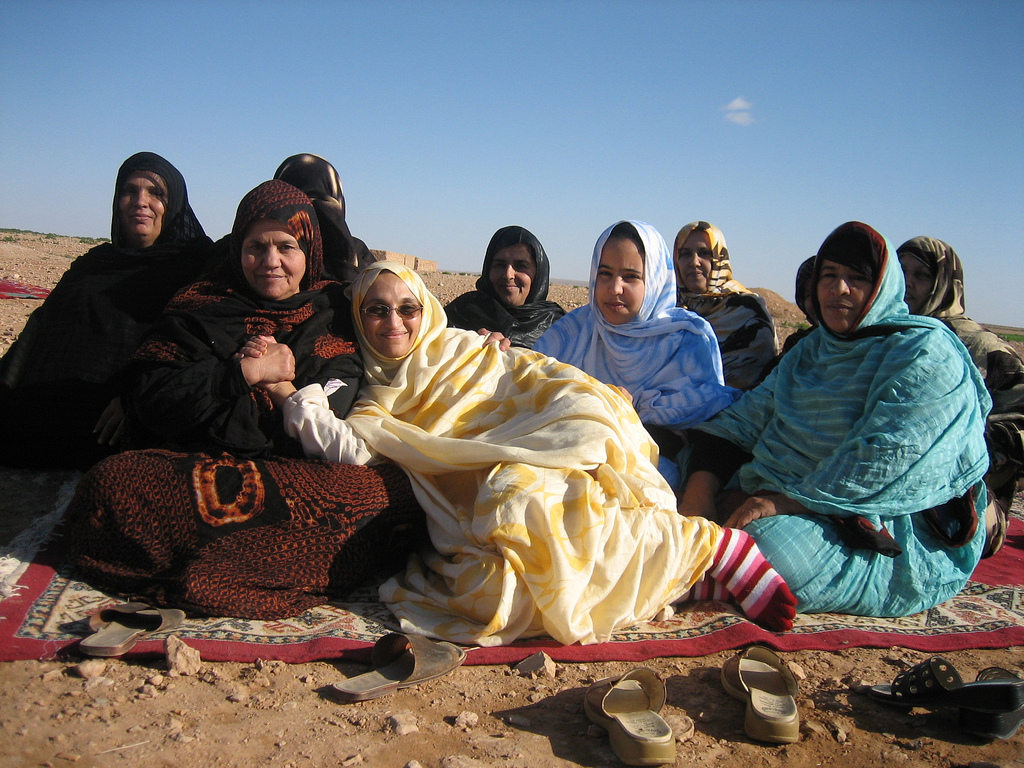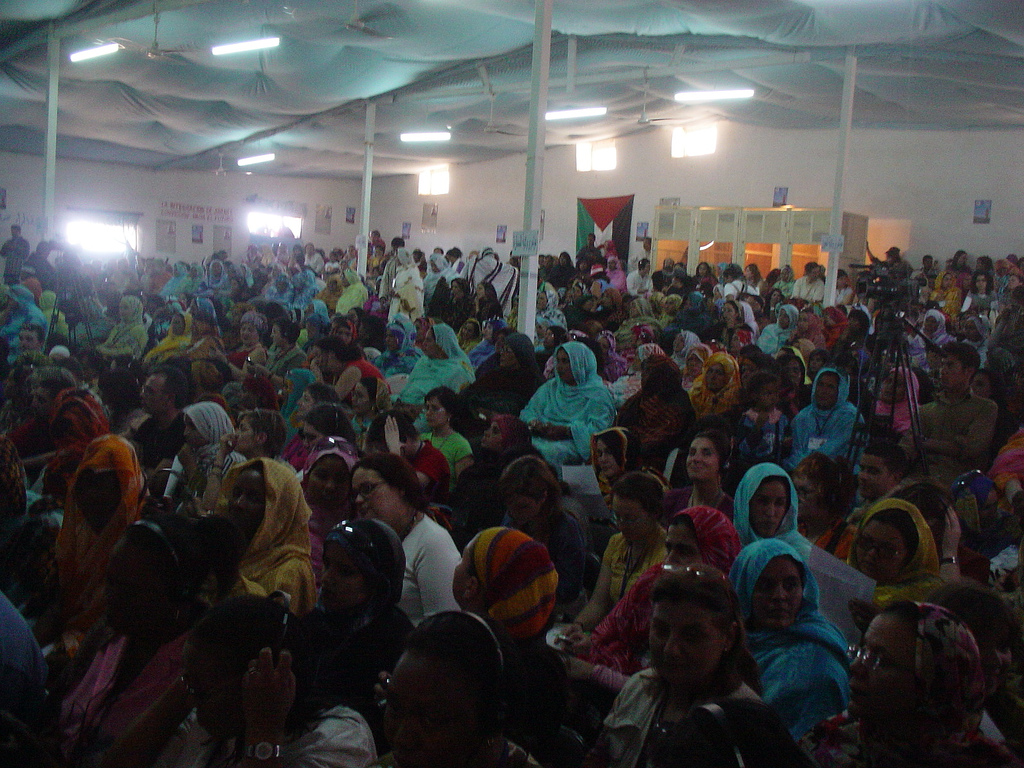|
Sahrawi Women
Women in the Sahrawi Arab Democratic Republic are women who were born in, who live in, or are from the Sahrawi Arab Democratic Republic (SADR, also romanized with Saharawi) in the region of the Western Sahara or the Sahrawi refugee camps. In Sahrawi society, the women share responsibilities at every level of its community and social organization.Donati, SimoneSaharawi Terra Project Photographers. Article 41 of the Constitution of the Sahrawi Arab Democratic Republic ensures that the state will pursue "the promotion of women and heirpolitical, social and cultural participation, in the construction of society and the country's development". Clothing Clothing worn by the Sahrawis include the robe called as the Daraa. Women wear the headscarf known as the mefhla. Role in refugee camps The Polisario Front, a national liberation movement that is recognized by the United Nations as the representative of the people of Western Sahara since 1979, has attempted to modernize the socie ... [...More Info...] [...Related Items...] OR: [Wikipedia] [Google] [Baidu] |
National Union Of Sahrawi Women
The National Union of Sahrawi Women (Spanish: ''Unión Nacional de Mujeres Saharauis'', UNMS) is the women's wing of the Polisario Front. It was created in 1974, and claims to have 10,000 members, divided between the Sahrawi refugee camps, the ''Liberated territories'', the Moroccan-occupied part of Western Sahara and the ''Sahrawi diaspora'' (including for instance Spain, Mauritania or France). Organization The organization is mostly active in the Sahrawi refugee camps in Tindouf, Algeria, where it is a powerful force within the POLISARIO and the Sahrawi republic. It is internationally active in organizing support for Sahrawi women and the Sahrawi cause, but also campaigns for women's rights within the exile community and in political decision-making. As a consequence of this, and of the special circumstances of the Western Sahara war years, the situation of Sahrawi women has improved noticeably. There are presently two women in the Sahrawi republic's government, the Minister o ... [...More Info...] [...Related Items...] OR: [Wikipedia] [Google] [Baidu] |
Hadjatu Aliat Swelm
Hadjatu Aliat Swelm, Arabic: حجاتو عليات سويلم (born 1973) is a Sahrawi poet, whose work examines the role of women in Sahrawi culture. Biography Swelm was born in the Sagir Valley, Western Sahara. She has written poetry throughout her life, mostly political work which was first and has subsequently been published under a pseudonym. In 1999, the publication of a poem she wrote about 66 political prisoners led to Moroccan authorities finding out her identity and a loss of her anonymity. After a rising number of police raids on her home and family, she moved to Aosserd camp Camp may refer to: Outdoor accommodation and recreation * Campsite or campground, a recreational outdoor sleeping and eating site * a temporary settlement for nomads * Camp, a term used in New England, Northern Ontario and New Brunswick to descri ..., in order to protect her family from Moroccan authorities. Her poetry focuses on the role of women within the Sahrawi struggle. Both she and th ... [...More Info...] [...Related Items...] OR: [Wikipedia] [Google] [Baidu] |
Al Khadra Mabrook
Al Khadra Mint Mabrook (; - October 2021), known as Al Khadra, was an internationally recognised Sahrawi poet. Biography Al Khadra was born circa 1934 in Tiris. Her family were Bedouin and her childhood was spent moving through the region so her family could find grazing for their animals. She learnt poetry from a young age by listening to others perform. The first poetry she learnt celebrated female beauty, but after the movement for self-determination from Spain started in the 1970s, her poetry changed to become socially conscious and celebrate the military achievements of the Polisario. Al Khadra is one of several poets, whose work has become a vital part of cultural resistance for the Sahrawi people. She is the only female Sahrawi poet to have documented the Western Sahara War from 1976 to 1991. Subjects of her poems include the Moroccan Western Sahara Wall, also known as the Berm; the Polisario's first tank; the refutation of "Moroccanisation" of her homeland; and p ... [...More Info...] [...Related Items...] OR: [Wikipedia] [Google] [Baidu] |
Sahara Press Service
Sahara Press Service (SPS) is the multi-lingual official press agency of the Sahrawi Arab Democratic Republic, the government in exile of the Western Sahara. The agency mainly report government-related news and current Sahrawi affairs, both from the liberated territories, the occupied territories and the Sahrawi refugee camps in Tindouf, Algeria. History The Polisario Front recognised the importance of press at an early stage. They took journalists to occupied territories and established the Sahara Press Service at the Sahrawi refugee camps on 29 March 1999 (A POLISARIO agency press had been founded previously in 1980). The Sahara Press Service Dispatches began to be posted on the internet since April 1999, due to the combined efforts of the Friends of Sahrawi People in Switzerland and Spain. Among the founders of SPS was the journalist and then SADR Minister of Information Mohamed Fadel Ismail Ould Es-Sweyih. Its current director and editor in chief is Saleh Nafee. The Sahar ... [...More Info...] [...Related Items...] OR: [Wikipedia] [Google] [Baidu] |
Sahrawi Legislative Election, 2008
Elections to the Sahrawi National Council were held between 17 and 19 February 2008. More than 126 candidates competed for the 53 seats in the Council, the unicameral legislature of the partially recognized Sahrawi Arab Democratic Republic. The Council was elected for a period of three years. The elections were only held in the Free Zone of Western Sahara and in Sahrawi refugee camps in Algeria, the rest of Western Sahara being under the ''de facto'' administration of Morocco. As stipulated in the Sahrawi constitution, the renewal of the Council occurred after the previous Council was dissolved following the 12th Congress of the Polisario Front, which took place two months earlier between 14 and 21 December 2007. First-time MPs represented 61.53% of those elected. The percentage of young people in the new Council stood at 57.67%, while women gained 34.61% of seats, thanks in part to a quota system. Mahfoud Ali Beiba was reelected Speaker of the Council on 27 February 2008. Ref ... [...More Info...] [...Related Items...] OR: [Wikipedia] [Google] [Baidu] |
Sahrawi National Council
The Sahrawi National Council (SNC) or Sahrawi Parliament is the legislature of the Sahrawi Arab Democratic Republic. Its structure and competences are guided by the Constitution of the Sahrawi Arab Democratic Republic (SADR). The present speaker since 2020 is Hamma Salama. It was first created by Polisario Front members and Sahrawi tribal notables as the Provisionary National Council in April or November 1975, after the proclamation of Guelta Zemmur. On February 27, 1976, POLISARIO leader El-Ouali Mustapha Sayed announced that the Council had declared the creation of the Sahrawi Arab Democratic Republic, of which it became the first parliament. On the POLISARIO's III General Popular Congress (August 26–30, 1976), a newly elected membership was formally installed as the Sahrawi National Council. The SNC is a unicameral body, with 53 seats, elected every two years (since the XIII POLISARIO Congress) at the General Popular Congresses by delegates from the Sahrawi refugee camps ... [...More Info...] [...Related Items...] OR: [Wikipedia] [Google] [Baidu] |
Bureaucracy
The term bureaucracy () refers to a body of non-elected governing officials as well as to an administrative policy-making group. Historically, a bureaucracy was a government administration managed by departments staffed with non-elected officials. Today, bureaucracy is the administrative system governing any large institution, whether publicly owned or privately owned. The public administration in many jurisdictions and sub-jurisdictions exemplifies bureaucracy, but so does any centralized hierarchical structure of an institution, e.g. hospitals, academic entities, business firms, professional societies, social clubs, etc. There are two key dilemmas in bureaucracy. The first dilemma revolves around whether bureaucrats should be autonomous or directly accountable to their political masters. The second dilemma revolves around bureaucrats' behavior strictly following the law or whether they have leeway to determine appropriate solutions for varied circumstances. Various commen ... [...More Info...] [...Related Items...] OR: [Wikipedia] [Google] [Baidu] |
UNMS
The National Union of Sahrawi Women (Spanish: ''Unión Nacional de Mujeres Saharauis'', UNMS) is the women's wing of the Polisario Front. It was created in 1974, and claims to have 10,000 members, divided between the Sahrawi refugee camps, the '' Liberated territories'', the Moroccan-occupied part of Western Sahara and the ''Sahrawi diaspora'' (including for instance Spain, Mauritania or France). Organization The organization is mostly active in the Sahrawi refugee camps in Tindouf, Algeria, where it is a powerful force within the POLISARIO and the Sahrawi republic. It is internationally active in organizing support for Sahrawi women and the Sahrawi cause, but also campaigns for women's rights within the exile community and in political decision-making. As a consequence of this, and of the special circumstances of the Western Sahara war years, the situation of Sahrawi women has improved noticeably. There are presently two women in the Sahrawi republic's government, the Minister ... [...More Info...] [...Related Items...] OR: [Wikipedia] [Google] [Baidu] |
UNHCR
The United Nations High Commissioner for Refugees (UNHCR) is a United Nations agency mandated to aid and protect refugees, forcibly displaced communities, and stateless people, and to assist in their voluntary repatriation, local integration or resettlement to a third country. It is headquartered in Geneva, Switzerland, with over 17,300 staff working in 135 countries. Background UNHCR was created in 1950 to address the refugee crisis that resulted from World War II. The 1951 Refugee Convention established the scope and legal framework of the agency's work, which initially focused on Europeans uprooted by the war. Beginning in the late 1950s, displacement caused by other conflicts, from the Hungarian Uprising to the decolonization of Africa and Asia, broadened the scope of UNHCR's operations. Commensurate with the 1967 Protocol to the Refugee Convention, which expanded the geographic and temporal scope of refugee assistance, UNHCR operated across the world, with the bu ... [...More Info...] [...Related Items...] OR: [Wikipedia] [Google] [Baidu] |
Feminism
Feminism is a range of socio-political movements and ideologies that aim to define and establish the political, economic, personal, and social equality of the sexes. Feminism incorporates the position that society prioritizes the male point of view and that women are treated unjustly in these societies. Efforts to change this include fighting against gender stereotypes and improving educational, professional, and interpersonal opportunities and outcomes for women. Feminist movements have campaigned and continue to campaign for women's rights, including the right to vote, run for public office, work, earn equal pay, own property, receive education, enter contracts, have equal rights within marriage, and maternity leave. Feminists have also worked to ensure access to contraception, legal abortions, and social integration and to protect women and girls from rape, sexual harassment, and domestic violence. Changes in female dress standards and acceptable physical act ... [...More Info...] [...Related Items...] OR: [Wikipedia] [Google] [Baidu] |




